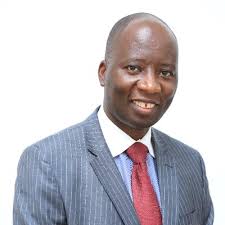Briefly, tell us about your journey. How and where did you start and where are you now? How did you get here?
Growing up on a family dairy farm in Fort Portal, I was and still very passionate about rearing Friesian Cows. I did Bachelors in Agriculture at Makerere University after missing out on Human medicine that my late father so much wanted me to do. When I look back, I see that I studied biological sciences because my father influenced me to pursue a target of becoming a human Doctor and not because of my strength which were clearly with numbers instead. I possibly should have targeted to become an Engineer instead.
None-the-less, Agricultural Economics facilitated me to join Centenary Bank to do Agriculture financing then sponsored by a USAID project code-named PL480. However, because the funding for PL480 was definite, so I strategically decided to quickly do a postgraduate in banking management with Nkozi University thereby transformed my career into Banking. I then completed the changeover with an MBA from University of Leicester. And now here I am, heading a bank!
In your profession, how much of your success is attributed to good parenting vs luck?
Good parental upbringing was the major key success factor. I was raised up in a proper family by a Veterinarian and a Teacher. Both parents were very hard working, strict, held strong Christian values and loved each other, their children and other people. They highly prioritized good morals above everything. My parents were simple civil savants, not very wealthy but extremely rich at heart and lived a very happy life. To date, they are my role models especially when it comes to defining a happy living.
However, some bit of luck also came my way. I was certainly lucky to have received school fees throughout my education life. I have also been entrusted with a lot of challenging responsibilities and subsequently privileged to attend many training courses mainly with Uganda Martyrs University, the Asian Banker, Euro-money, Strathmore Business School, Uganda Management Institute, Uganda Institute of Bankers, and external consultancies.
What top two skills would you say one must master to succeed and why?
Humility – humble enough to ask and seek to know what is important in life.
Ambition – working hard for high achievements.
As a leader, how do you identify and prepare a successor?
This is a difficult mix of art and science. I have had successful successions. Often, I train the staff below me to the level where they can take up managerial roles. The most interesting was in Centenary Bank where the General Manager conditioned me to train & mentor a successor so that he could implement my then, requested transfer to Head Office.
Surprisingly, after the training, it was instead my trainee who was transferred. I was asked to train another person. Good enough all the three of us are currently very successful bankers at very senior levels in different banks. I am not yet a trained professional coach but do currently coach many people in different banks.
If you are to share one life’s lesson: what would it be? Why?
I would like to encourage young people out there that it’s not difficult to succeed as long as one particularly stays to the Knighting and works hard, the sky is the limit. Short cuts in life don’t have ‘staying power’.
During my banking career, I have witnessed very many brilliant young people mess up their careers and future because of short cuts driven by temptations to get rich quickly.
We need young professionals who can accelerate, consolidate and expand their horizons.
What is your biggest fear and why?
I don’t have too many fears but just a concern that many young graduates in third world countries like Uganda, are not tailor-made for innovation, our Job markets or business needs but instead want short cuts to easy life at whatever cost.
We need a revolution in our education system at universities, other tertiary institution and lower levels to produce future ready graduates that are digital survey and innovative problem solvers of our future world.
On the whole, I would like to see young people preparing to take on the opportunities that, for instance, come with oil & gas sector in Uganda.
In addition to our current annual foreign exchange inflows of about USD 2-3 million, it’s expected that about USD 20 billion will flow in our country between year 2020 and 2024 to facilitate (be invested in) the Oil & gas sector.
This sector will directly employ over 50,000 artisans. All the good work being done at Kigumba and other related institutions notwithstanding, unfortunately we may end up importing many of these specialized artisans and other workers. We will as well import most of the input content for Oil & Gas and hand back our precious Forex to other better prepared economies.
Other minerals, Tourism, regional Trade, Agriculture and other sectors provide a lot of additional opportunities, but as the saying goes, it will only be the prepared ones who will reap the benefits of these national opportunities.








